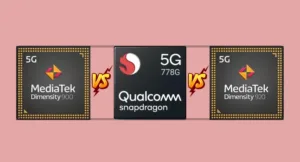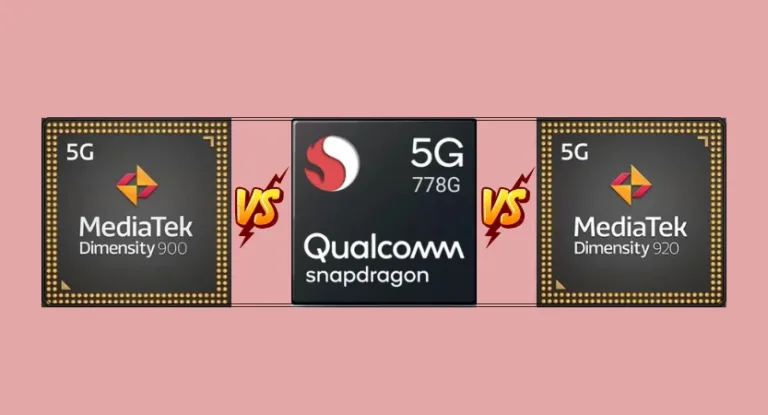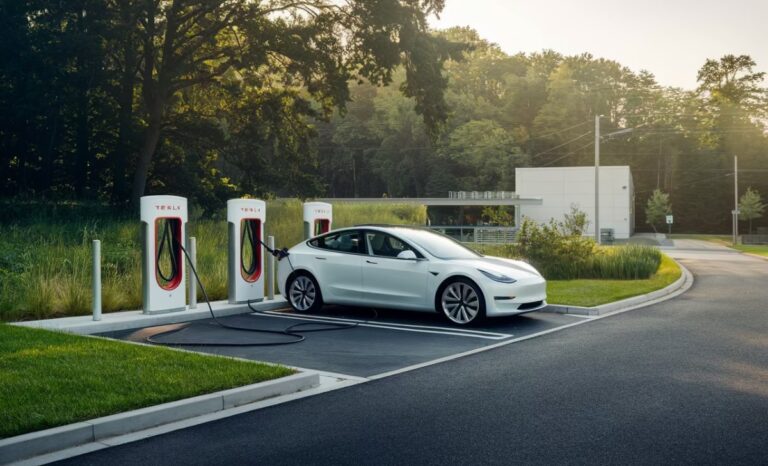The MediaTek Dimensity 920 is designed to appeal to smartphone users who love cameras, large screens, unstoppable, powerful and fast connections, and unlimited battery life. By integrating the latest technologies for the photo, video, display, and connectivity into a 6-nanometer chip, it delivers ultra-low power consumption that pushes the limits of the 5G smartphone experience.
MediaTek Dimensity 900 aims to capture every detail in every environment through its superior 4K HDR video recording engine and flagship noise reduction function. On-chip 5G through inherent enhancements and leading 6nm design provides faster, longer-distance connections and excellent power efficiency, thus breaking the limit of the smartphone or better battery life in this chip.
Of the two, MediaTek Dimensity has a powerful Cortex-A78 core clocked at 2.5GHz, with a Cortex-A55 design to improve power efficiency. The MediaTek Dimensity 920 provides up to 9% higher gaming performance than the MediaTek 900, the company said. The Dimensity 920 processor supports LPDDR4X and LPDDR5 RAM, as well as UFS 2.1 and UFS 3.1 memory, giving manufacturers flexibility in memory opportunities.
The Qualcomm Snapdragon 778G is designed to deliver cutting-edge mobile gaming and accelerated artificial intelligence (AI) for exceptional photo and video experiences. Qualcomm said the 778G is designed to meet the growing demand from global manufacturers looking for more platform options on the best platforms. The Snapdragon 778G brings most of the latest technology and advanced features to the high-end market. It also helps make next-generation device experiences easier.
These chips offer or provide very low power consumption and provide the best video and video recording experience of these chips and improve the performance and smoothness of the chips, while the Snapdragon chips are suitable for mobile games. best (AI) Flash ship performance ensures a great photo and video experience overall snapdragon chip is a multipurpose chip.
Let’s compare the processors.
In this article
Dimensity 920 vs Dimensity 900 vs Snapdragon 778G:
| Snapdragon 778G | Dimensity 900 | Dimensity 920 (NEW) | |
| Announced | May 2021 | May 2021 | August 2021 |
| CPU | 1x ARM Cortex -A78 @ 2.40GHz 3x ARM Cortex – [email protected] 4x ARM Cortex – [email protected] CPU Clock Speed: Up to 2.4 GHz | 2x CPU Type 1-Arm Cortex-A78 Up to @ 2.4GHz 6x CPU Type 2-Arm Cortex-A55 @ Up to 2GHz CPU Clock Speed: Up to 2.4 GHz | 2x CPU Type 1-Arm Cortex-A78 Up to @ 2.5GHz 6x CPU Type 2-Arm Cortex-A55 Up to @ 2.0GHz CPU Clock Speed: Up to 2.5 GHz |
| GPU | Adreno 642L GPU | Arm Mali-G68 MC4 | Arm Mali-G68 MC4 |
| Heterogeneous Multi-Processing | YES | YES | YES |
| Processor Architecture | 6 nm | 6 nm | 6 nm |
| CPU Bit | 64-bit | 64-bit | 64-bit |
| Core | Octa-Core | Octa-Core | Octa-Core |
| Modem | X53 5G Modem-RF | 5G – Mixed duplex FDD+TDD CA | 5G – Mixed duplex FDD+TDD CA |
| Download Speed | 3.7 Gbps | 2.7 Gbps | 2.8 Gbps |
| Upload Speed | 2.9 Gbps | 1.2 Gbps | 1.3 Gbps |
| Wi-Fi | Wi-Fi 6E, Wi-Fi 6, Wi-Fi 5, 802.11a/b/g/n | Wi-Fi 6 (a/b/g/n/ac/ax) | Wi-Fi 6 (a/b/g/n/ac/ax) |
| Wi-Fi Antenna | FastConnect 6700 System | 2T2R | 2T2R |
| Display Type | Max On-Device Display: FHD+ @ 144 Hz Max External Display: 4K @ 60 Hz HDR: HDR10+, HDR10 | Max Display Resolution – 2520 x 1080 Max Refresh Rate – 120Hz HDR: HDR10+, HDR10 | Max Display Resolution – 2520 x 1080 Max Refresh Rate – 120Hz HDR: HDR10+, HDR10 |
| Camera | Image Signal Processor – Triple 14-bit ISPs, Qualcomm Spectra 570L image signal processor Triple Camera, MFNR, ZSL, 30fps – Up to 22 MP Dual Camera, MFNR, ZSL, 30fps – Up to 36+22 MP Single Camera, MFNR, ZSL, 30fps – Up to 64 MP Single Camera – Up to 192 MP Camera Features – 10-bit HDR HEIF photo capture, Multi-frame Noise Reduction (MFNR), HEIC photo capture, AI-based auto-focus and auto-exposure | Max Camera ISP – 108MP, 20MP + 20MP Max Video Capture Resolution – 3840 x 2160 Camera Features – Hardware video HDR, 3X HDR-ISP, MFNR, 3DNR, AINR, Hardware Depth Engine, Warping Engine | Max Camera ISP – 108MP, 20MP + 20MP Max Video Capture Resolution – 3840 x 2160 Camera Features – Hardware video HDR, 3X HDR-ISP, MFNR, 3DNR, AINR, Hardware Depth Engine, Warping Engine |
| AI Accelerator | YES | YES | YES |
| Ram Support | LPDDR4X / LPDDR5 Up to 16GB in 3200 MHz | LPDDR4X / LPDDR5 Up to 16GB in 3200 MHz | LPDDR4X / LPDDR5 Up to 16GB in 3200 MHz |
| Storage Support | UFS 2.1, UFS 3.1 | UFS 2.1, UFS 3.1 | UFS 2.1, UFS 3.1 |
| Video | Slow Motion Video Capture – 720p @ 240 FPS Video Capture Formats – HDR10, HDR10+, HLG Video Capture (30 FPS) – Up to 4K video capture Video Capture Features – Rec. 2020 color gamut video, Staggered HDR sensor support, Up to 10-bit color depth video capture Support – HDR10+, HDR10, HLG, H.264 (AVC), H.265 (HEVC), VP8, VP9 | Video Encoding – H.264, H.265 / HEVC Video Encoding FPS – 4K @ 30FPS Video Playback – H.264, H.265 / HEVC, MPEG-1/2/4, VP-9, AV1 Video Playback FPS – 4K @ 30FPS | Video Encoding – H.264, H.265 / HEVC Video Encoding FPS – 4K @ 30FPS Video Playback – H.264, H.265 / HEVC, MPEG-1/2/4, VP-9, AV1 Video Playback FPS – 4K @ 30FPS |
| Bluetooth | Bluetooth 5.2 | Bluetooth 5.2 | Bluetooth 5.2 |
| Navigation | Beidou, Galileo, GLONASS, NavIC enabled, GPS, QZSS | GPS L1CA+L5 / BeiDou B1I+ B2a / Glonass L1OF / Galileo E1 + E5a / QZSS L1CA+ L5 / NavIC | GPS L1CA+L5 / BeiDou B1I+ B2a / Glonass L1OF / Galileo E1 + E5a / QZSS L1CA+ L5 / NavIC |
| NFC | Supported | Supported | Supported |
| Security | Fingerprint Sensor: Qualcomm 3D Sonic, Qualcomm 3D Sonic Max Biometric Authentication: Fingerprint, Iris, Voice, Face | In-display Fingerprint Sensor Biometric Authentication: Fingerprint, Iris, Voice, Face | In-display Fingerprint Sensor Biometric Authentication: Fingerprint, Iris, Voice, Face |
| RATING | ★★★★★ | ★★★★ | ★★★★ |





